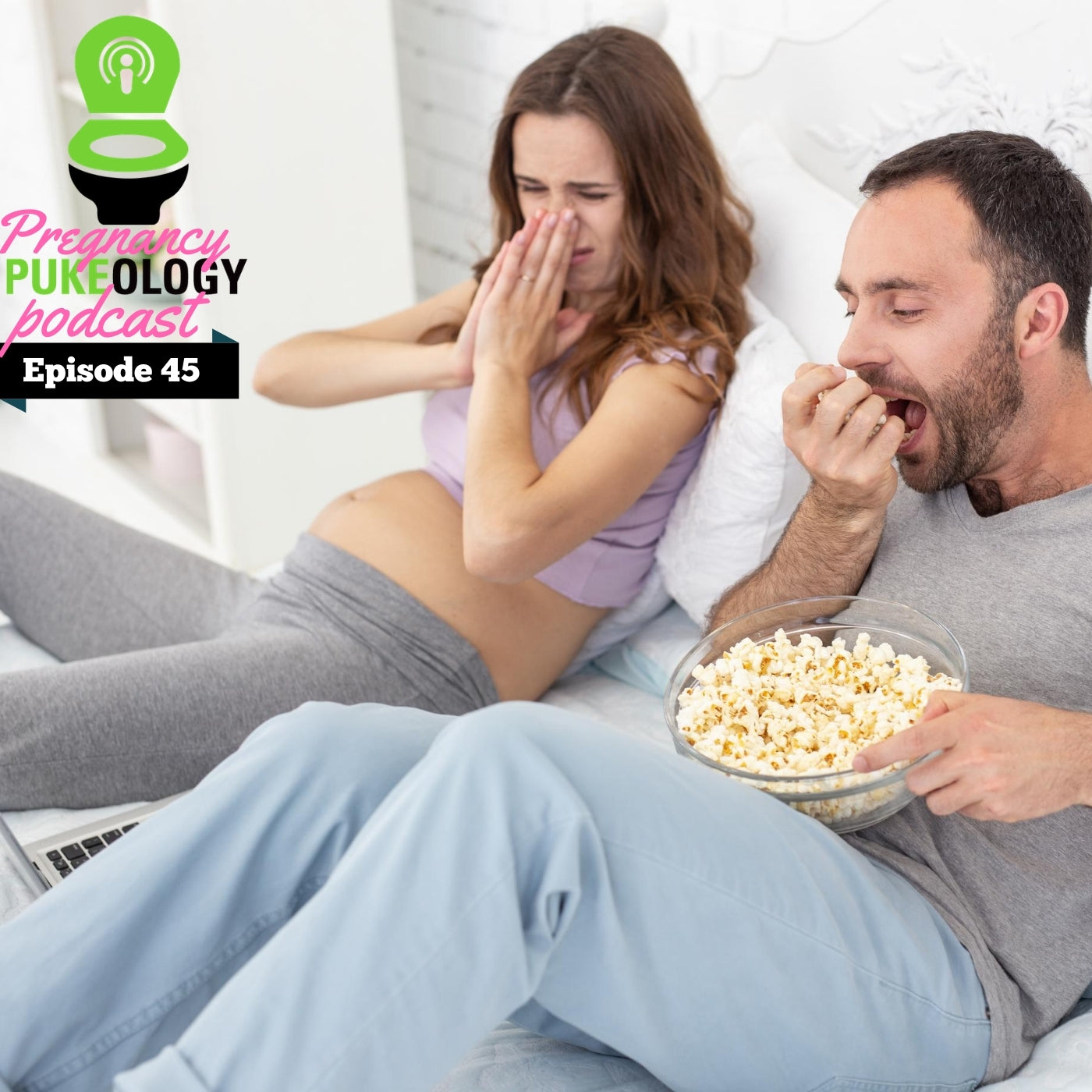
Pregnancy Gas: Why do Pregnancy Farts Smell?
Have you ever wondered why am I so gassy while pregnant? Or why do pregnancy farts smell so bad? This Pregnancy Gas Blog is perfect for you to hear the real science behind cutting the cheese. Plus get tips on natural gas x for pregnancy, pregnancy safe laxatives, plus stool softeners that are safe in pregnancy to use in combination with your prenatal vitamins. If you don't want to SEE the stench just listen to it Pregnancy Pukeology Podcast Episode 45: Pregnancy Gas

Why does pregnancy cause gas and other digestive issues?
Some of the females face gastric issues during pregnancy like nausea, vomiting, esophageal reflux, gastritis, diarrhea, constipation, and flatulence. Constipation is the commonest problem that women usually face during pregnancy. Three, out of four women face constipation and other bowel issues at some point during pregnancy. The human body produces more female related hormones named progesterone which is responsible for the relaxation of your body muscles, including the muscles that are present in your intestine. As a result of it, the food passes through the intestine quite slowly which leads to indigestion and builds up gases within them and causes bloating, excessive burps, and flatulence.
Pregnancy Constipation
Constipation can be a symptom of pregnancy. It happens when you are having less than three bowel movements per week. Usually bloating and constipation happens side-by-side and is quite uncomfortable sometimes they put you in an awkward situation. Both issues have similar reasons. If you need to repeatedly visit the bathroom for urination or pee but fewer times than the others, then pregnancy could be the cause.
Constipation in early pregnancy
As we know that the progesterone level increases day by day during pregnancy causing relaxation of all the body muscles including those that are present in the intestine. So, food passes through the intestine gradually and as a result of which Bowel movement gets slower leading to constipation. However, pressure on the womb and iron supplements can also cause constipation during pregnancy.
Gas in Early Pregnancy
A rise in the estrogen and progesterone levels in the blood of the pregnant female leads to the increasing body swelling and often present in pregnancy gas. The tenure of developing gas usually lasts in the first trimester in the pregnancy but sometimes it may last for the whole nine months till delivery.
The most important pregnancy hormone is the progesterone whose major function is to relax all body muscles including the muscles that are present in our digestive system. As a result of which our intestine work slowly and the food passes through them gradually and this gives more time for the nutrients to get absorbed back into the blood as a result of which the stool get dry and more gas is being produced due to this increase in transient time of food within the intestine, resulting in the pregnancy gas or bloating. You don’t need to have this feeling from the very beginning of pregnancy. It may start at any time during these nine months. Along with this intake of low fiber diet, less activity during pregnancy, and drinking small amounts of fluids can also be a cause of constipation. Intake of iron as a supplement during pregnancy is important yet it plays a vital role in causing constipation most of the time.
Why do pregnancy cause gas and other digestive issues?
Some of the females face gastric issues during pregnancy like nausea, vomiting, esophageal reflux, gastritis, diarrhea, constipation, and flatulence. Constipation is the commonest problem that women usually face during pregnancy. Three, out of four women face constipation and other bowel issues at some point during pregnancy. The human body produces more female related hormones named progesterone which is responsible for the relaxation of your body muscles, including the muscles that are present in your intestine. As a result of it, the food passes through the intestine quite slowly which leads to indigestion and builds up gases within them and causes bloating, excessive burps, and flatulence.
Is gas a sign of pregnancy?
Looking for relief for your GERD or really bad heartburn during pregnancy? NoMo Nausea Band helps to move food along thru your intestines quicker, and make sure nothing comes back up with its natural 3:1 patented technology of essential oil infused pressure point therapy. Since it helps increase gastromotility, it will also help to ease constipation. Think of NoMo Brands as your go to in pregnancy, as they have clinically proven and doctor approved products for nausea, migraines, and even sleep problems. Check it out right now.
or really bad heartburn during pregnancy? NoMo Nausea Band helps to move food along thru your intestines quicker, and make sure nothing comes back up with its natural 3:1 patented technology of essential oil infused pressure point therapy. Since it helps increase gastromotility, it will also help to ease constipation. Think of NoMo Brands as your go to in pregnancy, as they have clinically proven and doctor approved products for nausea, migraines, and even sleep problems. Check it out right now.

Constipation in early pregnancy?
Constipation can be a symptom of pregnancy. It happens when you are having less than three bowel movements per week. Usually bloating and constipation happens side-by-side and is quite uncomfortable sometimes they put you in an awkward situation. Both issues have similar reasons. If you need to repeatedly visit the bathroom for urination or pee but fewer times than the others, then pregnancy could be the cause.
As we know that the progesterone level increases day by day during pregnancy causing relaxation of all the body muscles including those that are present in the intestine. So, food passes through the intestine gradually and as a result of which Bowel movement gets slower leading to constipation. However, pressure on the womb and iron supplements can also cause constipation during pregnancy.
Smelly Cheeses
Have you ever wondered why farting is called cut the cheese? The stinker the cheese the better. When my parents took me to France as a teenager, my mom bought this cheese that smelled so bad after we cut into it the first day that we had to keep it outside on the porch of our hotel room. Dirty feet smelled why better and I remember asking her why the cheese smelled so bad when it cost a lot of money. My mom said what most do that the smell is because cheese is made from spoiled milk BUT THAT IS WRONG.

The foul cheese smell is caused by the bacterial Brevibacterium linens shorted, B. linens, that breakdown the protein on the outer layer of the cheese rind and release a stinky gas. When the rind is intact the smell isn't as bad because the bacteria can't do it's job and break down the protein, especially when wax is used to coat the outside. The big BUT is when the cheese is cut and the more surface area the bacteria has to digest the milk protein, the more the release of the atrocious odor. Now to the science behind pregnancy stinky gas.
The solution to this problem is to have small frequent meals (5-6 smaller meals) regularly and keep yourself away from the food that produces gas in your digestive system. Sit up nice and straight after eating too, and allow one hour for digestion prior to physical activity. You want to be physically active during pregnancy with walking, prenatal yoga, or swimming. Want a few more ideas? Listen to Pregnancy Pukeology Podcast Episode 44: Pregnancy Safe Exercises.
These foods include beans,cabbage, sweets, and fried items. You are also advised to eat and drink slowly so that it may prevent excessive swallowing of air. Yoga and other exercises may also help in solving this issue. If constipation is associated with iron intake, then you need to take a stool softener along with iron supplements. However, if you are facing a severe pregnancy gas problem then you need to consult your doctor and get some medications.
Pregnancy constipation relief
Intake of the food that is rich in fiber. A pregnant woman should consume at least 25 to 30 grams of fiber in the diet every day to stay healthy. Fruits, vegetables, beans, lentils, bran cereals, prunes, and whole wheat bread have high fiber in them. Try to use raspberries, apples, bananas, figs, strawberries, fresh fruit salad, and roasted sweet corn, carrots, sprouts, and Brussels. Keep yourself hydrated by drinking a lot of water and fluids can resolve this issue.Hydration means that you must double the intake of fluids, that is you should drink at least 240 to 360-ml glass of water a day. If you are facing worsening of problem, then adding pear or apple juice in your diet may also help you out.
How can I relieve constipation?
Dividing your daily food intake in 5- 6 small meals would also relieve your constipation as this would allow the stomach to digest food without getting overburden and food gets transferred from the stomach to the intestine smoothly. Daily exercises can also regulate your bowel habit and relieve constipation.For that, you are advised to take almost 20 to 30-minute sessions every day for 5 days a week minimally. Sometimes changing your prenatal vitamins can also result in a decrease in symptoms as some of them cause less constipation than rest.
However, if you are facing severe constipation issues then you need to visit your doctor and get some medication for that.
Stool softener that is safe during pregnancy?
Most stool softeners are usually considered safe during pregnancy. Stool softener like Colace, lubricate, and moist the stool and make it easy to pass through the bowel. Stool softeners do not cause any harmful effects on your developing baby. Their active ingredients usually don't absorb that much to your body that would harm your baby. The only thing that you need to be careful of is to consult your doctor before taking any medicine as a stool softener as they might cause dehydration and electrolyte imbalance.

Pregnancy safe laxatives
It is the best idea to relieve your constipation through natural remedies. Here are a list of 20 natural laxatives that are high in fiber to keep your pipes clean.
- Chia Seeds
- Berries
- Legumes (Beans)
- Flaxseeds
- Kefir (yougurt)
- Castor Oil (not recommended your last trimester because diahrea can induce labor)
- Leafy Greens
- Senna (natural stimulant of the bowels)
- Apples (pectin- soluble fiber that acts as a laxative)
- Olive Oil
- Rhubarb
- Aloe Vera
- Oat Bran (14 g of fiber in just one cup!)
- Prunes
- Kiwi fruit (both insoluble and soluble fiber plus pectin, which helps increase gastro-motility)
- Magnesium Citrate
- Coffee (produces gastrin which is a hormone that increases the release of gastric acid, hence why adds to worsting reflux, and increases the movement of the intestinal muscles. This is why you always have to poop within 15 minutes of drinking your first cup of coffee, and the caffeine is a stimulant too. Remember ladies only 1 cup of coffee a day.)
- Psyllium (husk contains a soluble fiber that works by absorbing water and forms into a gel, creating a stool softener effect on the body... the more lube the better, right ladies ;)
- Water (drink at least 2 Liters per day to avoid constipation)
- Sugar substitutes (pass thru the gut un-absorbed drawing water into the intestines which speeds up the the transit in the gut.
However, if none work for you can take any type of mild laxatives. One of the mildest laxatives that you can during your pregnancy is a milk of magnesia or sometime Metamucil, or docusate to relieve your symptoms. If still nothing working, do consult your doctor before starting any other stronger form of laxatives.
